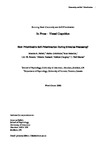How prioritized is self-prioritization during stimulus processing?
| dc.contributor.author | Falbén, JK | en |
| dc.contributor.author | Golubickis, M | en |
| dc.contributor.author | Balseryte, R | en |
| dc.contributor.author | Persson, LM | en |
| dc.contributor.author | Tsamadi, D | en |
| dc.contributor.author | Caughey, S | en |
| dc.contributor.author | Neil Macrae, C | en |
| dc.date.accessioned | 2020-04-07T10:36:53Z | |
| dc.date.available | 2020-04-07T10:36:53Z | |
| dc.date.issued | 2019-01-02 | en |
| dc.identifier.issn | 1350-6285 | en |
| dc.identifier.uri | http://hdl.handle.net/10026.1/15522 | |
| dc.description.abstract |
Recent research has suggested that self-relevance automatically enhances stimulus processing (i.e., the self-prioritization effect). Notably, information associated with one’s self elicits faster responses than comparable material associated with other targets (e.g., friend, stranger). Challenging the assertion that self-prioritization is an obligatory process, here we hypothesized that self-relevance only facilitates performance when task sets draw attention to previously formed target-object associations. The results of two experiments were consistent with this viewpoint. Compared with arbitrary objects owned by a friend, those owned by the self were classified more rapidly when participants were required to report either the owner or identity of the items (i.e., semantic task set). In contrast, self-relevance failed to facilitate performance when participants judged the orientation of the stimuli (i.e., perceptual task set). These findings demonstrate the conditional automaticity of self-prioritization during stimulus processing. | en |
| dc.format.extent | 46 - 51 | en |
| dc.language.iso | en | en |
| dc.title | How prioritized is self-prioritization during stimulus processing? | en |
| dc.type | Journal Article | |
| plymouth.issue | 1 | en |
| plymouth.volume | 27 | en |
| plymouth.publication-status | Published | en |
| plymouth.journal | Visual Cognition | en |
| dc.identifier.doi | 10.1080/13506285.2019.1583708 | en |
| plymouth.organisational-group | /Plymouth | |
| plymouth.organisational-group | /Plymouth/Faculty of Health | |
| plymouth.organisational-group | /Plymouth/Faculty of Health/School of Psychology | |
| plymouth.organisational-group | /Plymouth/REF 2021 Researchers by UoA | |
| plymouth.organisational-group | /Plymouth/REF 2021 Researchers by UoA/UoA04 Psychology, Psychiatry and Neuroscience | |
| plymouth.organisational-group | /Plymouth/REF 2021 Researchers by UoA/UoA04 Psychology, Psychiatry and Neuroscience/UoA04 Psychology, Psychiatry and Neuroscience MANUAL | |
| plymouth.organisational-group | /Plymouth/Users by role | |
| plymouth.organisational-group | /Plymouth/Users by role/Academics | |
| dc.identifier.eissn | 1464-0716 | en |
| dc.rights.embargoperiod | Not known | en |
| rioxxterms.versionofrecord | 10.1080/13506285.2019.1583708 | en |
| rioxxterms.licenseref.uri | http://www.rioxx.net/licenses/all-rights-reserved | en |
| rioxxterms.type | Journal Article/Review | en |


